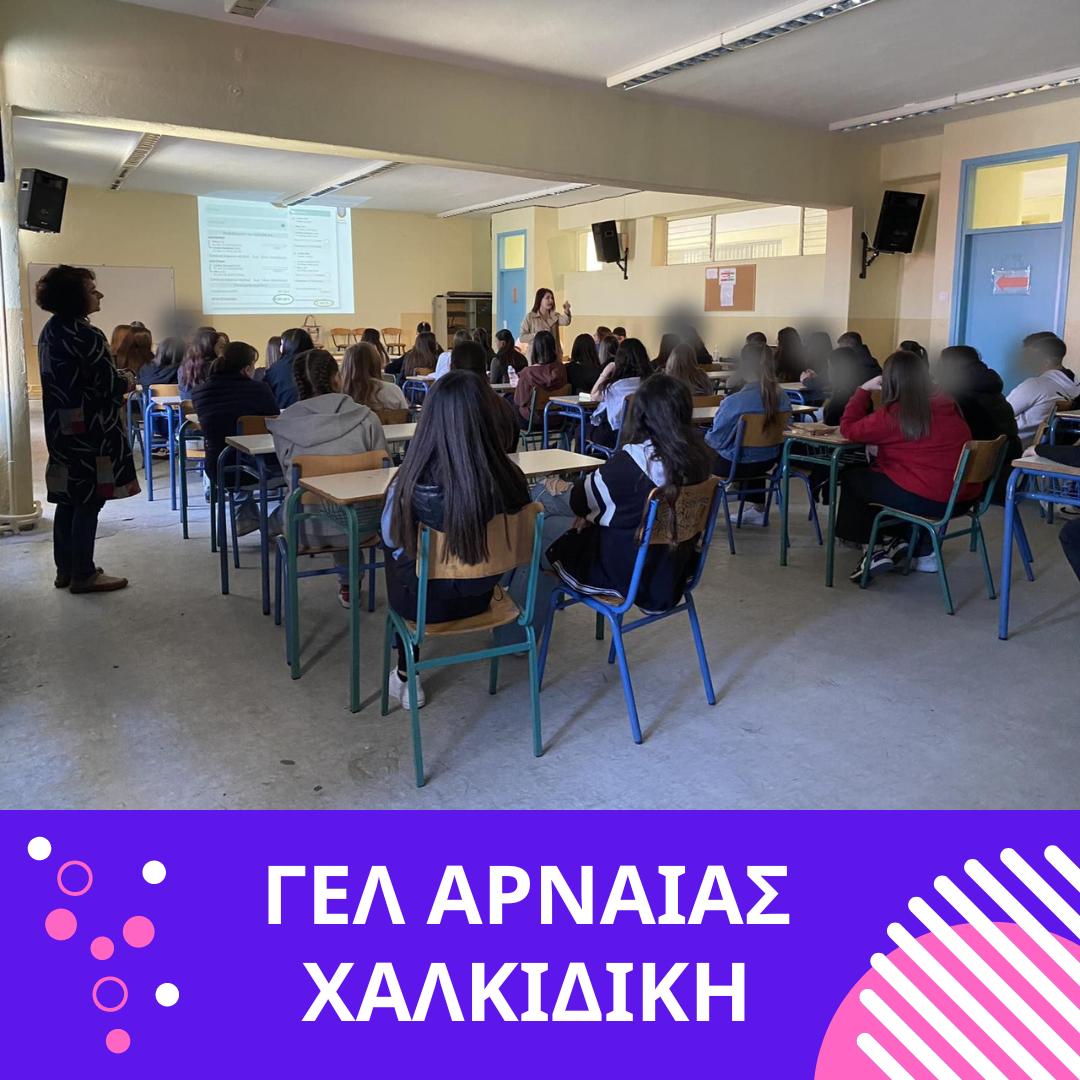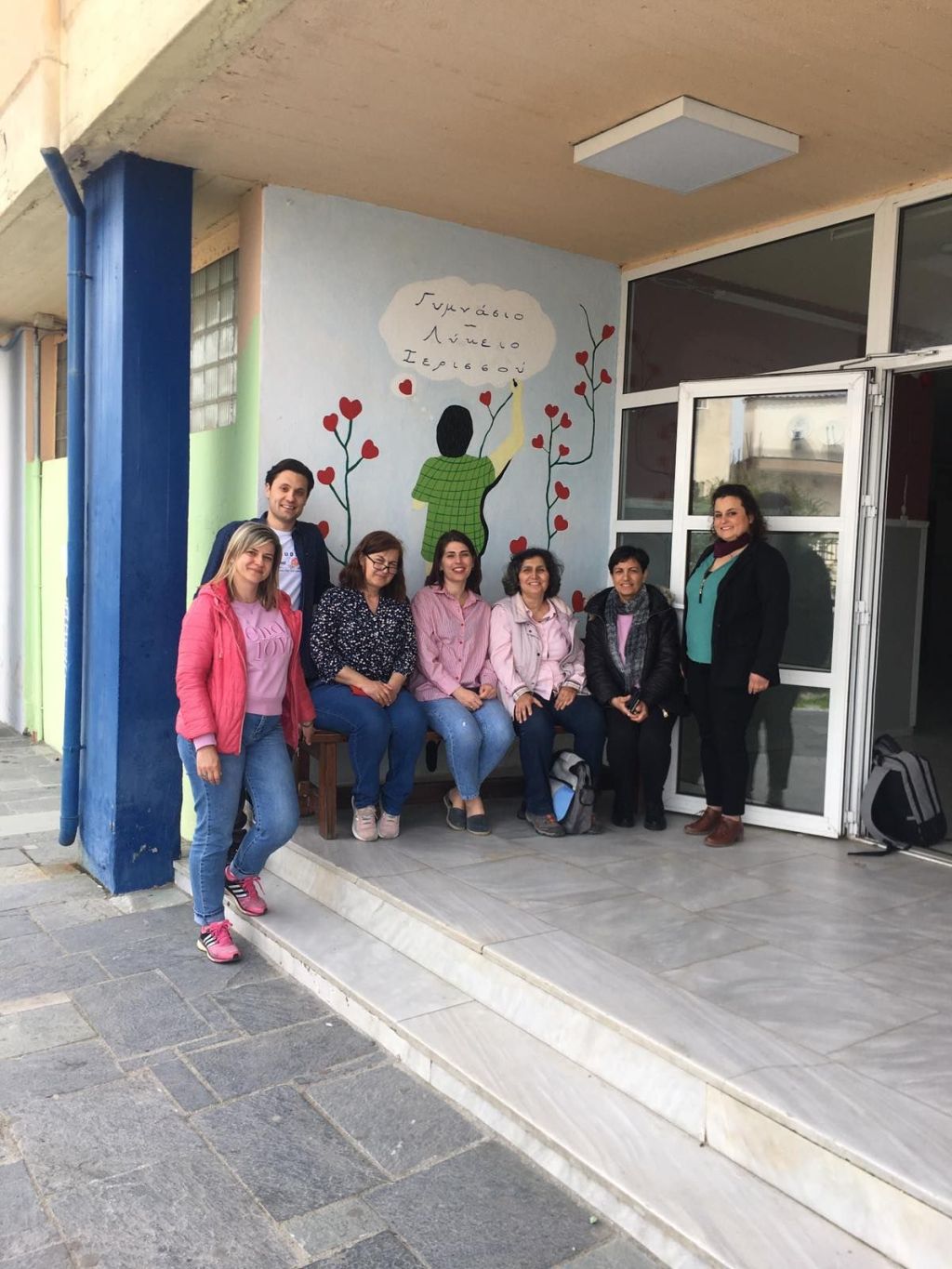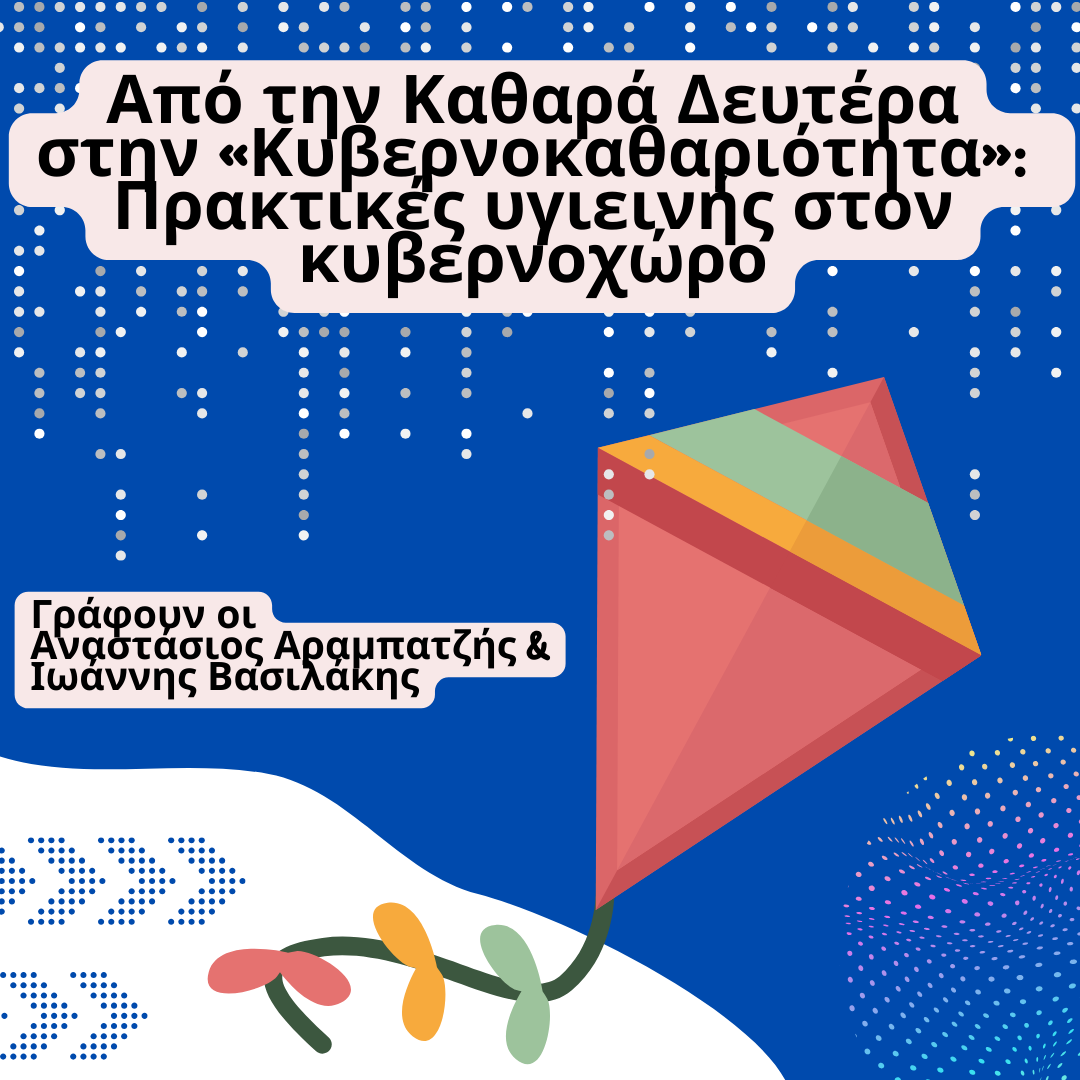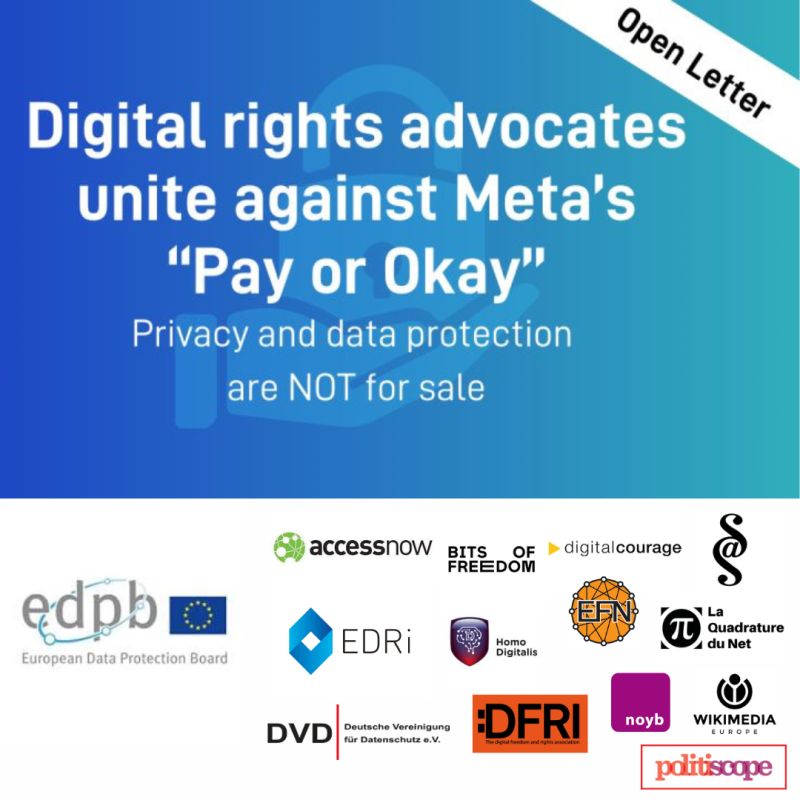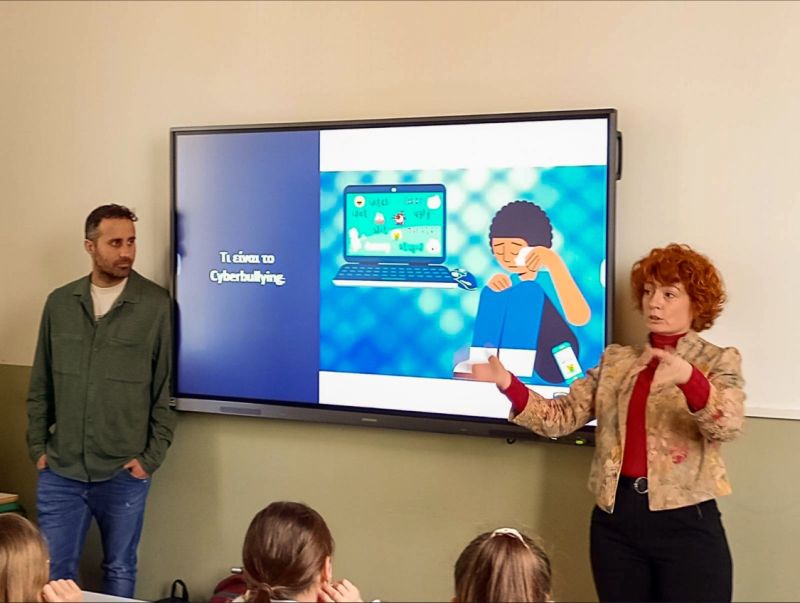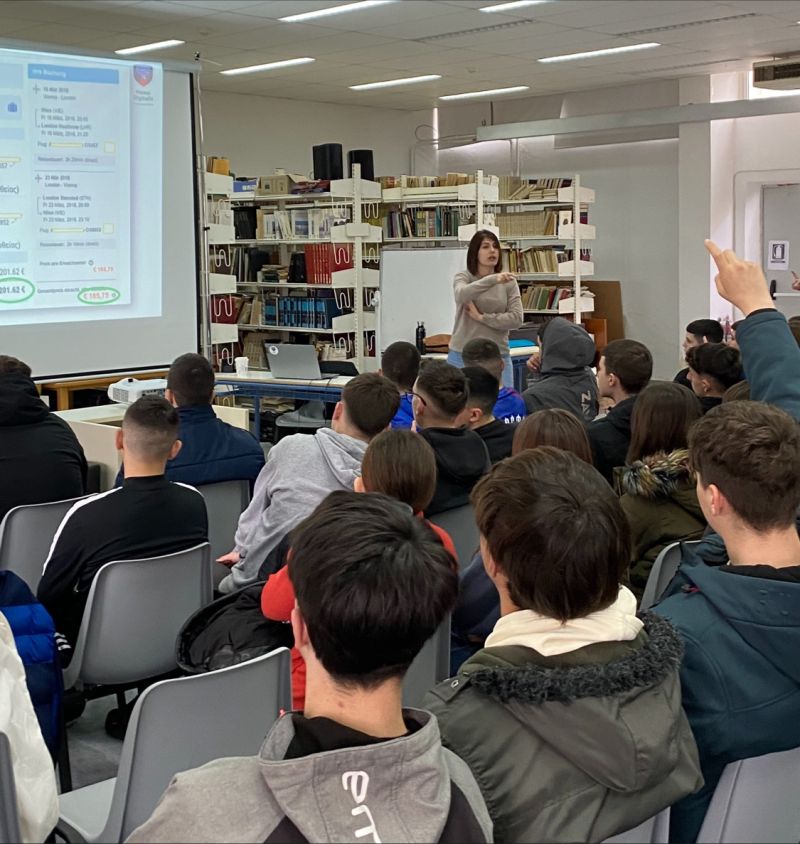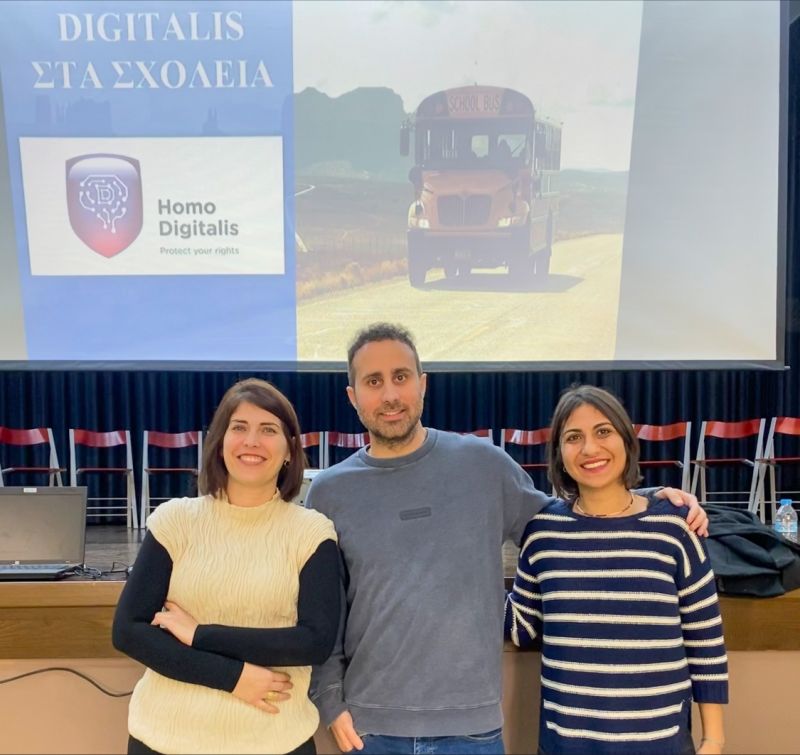Voluntary educational actions in schools: Homo Digitalis visits Arnaia High School in Halkidiki
Last week Homo Digitalis hit the road again!
After the very successful 1500 km tour in the Peloponnese and Central Greece, the 4 schools and the more than 600 students and teachers we met there, this time it was the turn of Northern Greece with 5 different schools and a new record of kilometers and students!
After Serres, it was the turn of Chalkidiki!
The second school (see the first one here) we visited there was the High School of Arnaia! Our Director for Artificial Intelligence and Human Rights, Lamprini Gyftokosta, spoke with the students of the first grade about the digital footprint and was lucky enough to be in front of an incredible audience, who asked pertinent questions, exercised their critical thinking and responded positively to our call for more control of our personal data!
We would like to thank the Director Mr. Tsiliverdi Dimitrios and the IT Teacher Ms. Eleni Letta for the invitation!
Homo Digitalis’ actions in the field of student awareness are carried out with the organization’s own resources and with the contribution of our network of volunteers! Your support is very important to achieve more in the new year!
Voluntary educational actions in schools: Homo Digitalis visits the High School of Ierissos
Last week Homo Digitalis literally hit the road again!
After the very successful 1500 km tour in the Peloponnese and Central Greece, the 4 schools and the more than 600 students and teachers we met there, this time it was the turn of Northern Greece with 5 different schools and a new record of kilometers and students!
After Serres, it was the turn of Chalkidiki!
Homo Digitalis talked about the digital footprint to all the students of the Ierissos High School and Ierissos Gymnasium. The active participation of the children and teachers in these interactive presentations fills us with joy and hope, but also with ideas for a wider public awareness on these issues.
We thank Charalambos Daftsios and Lambrini Yftokosta for representing us to over 350 children and especially to our excellent host and Director of the High School, Mrs. Mavroudi for inviting us to host the event.
Homo Digitalis’ actions in the field of student awareness are carried out with the organization’s own resources and with the contribution of our network of volunteers! Your support is very important to achieve more in the new year!
Voluntary educational actions in schools: Homo Digitalis visits the 3rd High School of Serres
Last week Homo Digitalis hit the road again!
After the very successful 1500 km tour in the Peloponnese and Central Greece, the 4 schools and the more than 600 students and teachers we met there, this time it was the turn of Northern Greece with 5 different schools and a new record of kilometers and students!
We started from Serres, in a historic place, a neoclassical building built in 1885 to house the city’s hospital and then converted into the first Gymnasium of Thileon Serres, and now operating as the 3rd Gymnasium of the city! We were there on April 1 to talk to students and teachers about the digital footprint.
We would like to thank the Director Mrs. Arapaki Chrysanthi and the IT teacher Mr. Moscholios Stavros for the invitation!
Homo Digitalis’ actions in the field of student awareness are carried out with the organization’s own resources and with the contribution of our network of volunteers! Your support is very important to achieve more in the new year!
From Clean Monday to Cyber Cleanliness: Bridging Traditions with Modern Cyber Hygiene Practices
By Anastasios Arampatzis and Ioannis Vassilakis
In the heart of Greek tradition lies Clean Monday, which marks the beginning of Lent leading to Easter and symbolizes a fresh start, encouraging cleanliness, renewal, and preparation for the season ahead. This day, celebrated with kite flying, outdoor activities, and cleansing the soul, carries profound significance in purifying one’s life in all aspects.
Just as Clean Monday invites us to declutter our homes and minds, there exists a parallel in the digital realm that often goes overlooked: cyber hygiene. Maintaining a clean and secure online presence is imperative in an era where our lives are intertwined with the digital world more than ever.
Understanding Cyber Hygiene
Cyber hygiene refers to the practices and steps that individuals take to maintain system health and improve online security. These practices are akin to personal hygiene routines; just as regular handwashing can prevent the spread of illness, everyday cyber hygiene practices can protect against cyber threats such as malware, phishing, and identity theft.
The importance of cyber hygiene cannot be overstated. In today’s interconnected world, a single vulnerability can lead to a cascade of negative consequences, affecting not just the individual but also organizations and even national security. The consequences of neglecting cyber hygiene can be severe:
- Data breaches.
- Identity theft.
- Loss of privacy.
As we celebrate Clean Monday and its cleansing rituals, we should also adopt cyber hygiene practices to prepare for a secure and private digital future free from cyber threats.
Clean Desk and Desktop Policies – The Foundation of Cyber Cleanliness
Just as Clean Monday encourages us to purge our homes of unnecessary clutter, a clean desk and desktop policy is the cornerstone of maintaining a secure and efficient workspace, both physically and digitally. These policies are not just about keeping a tidy desk; they’re about safeguarding sensitive information from prying eyes and ensuring that critical data isn’t lost amidst digital clutter.
- Clean Desk Policy ensures that sensitive documents, notes, and removable storage devices are secured when not in use or when an employee leaves their desk. It’s about minimizing the risk of sensitive information falling into the wrong hands, intentionally or accidentally.
- Clean Desktop Policy focuses on the digital landscape, advocating for a well-organized computer desktop. This means regularly archiving or deleting unused files, managing icons, and ensuring that sensitive information is not exposed through screen savers or unattended open documents.
The benefits of these policies are profound:
- Reduced risk of information theft.
- Increased efficiency and enhanced productivity.
- Enhanced professional image and competence.
The following simple tips can help you maintain cleanliness:
- Implement a Routine: Just as the rituals of Clean Monday are ingrained in our culture, incorporate regular clean-up routines for physical and digital workspaces.
- Secure Sensitive Information: Use locked cabinets for physical documents and password-protected folders for digital files.
- Adopt Minimalism: Keep only what you need on your desk and desktop. Archive or delete old files and dispose of unnecessary paperwork.
Navigating the Digital Landscape: Ad Blockers and Cookie Banners
Using ad blockers and understanding cookie banners are essential for maintaining a clean and secure online browsing experience. As we carefully select what to keep in our homes, we must also choose what to allow into our digital spaces.
- Ad Blockers prevent advertisements from being displayed on websites. While ads can be a source of information and revenue for site owners, they can also be intrusive, slow down web browsing, and sometimes serve as a vector for malware.
- Cookie Banners inform users about a website’s use of cookies. Understanding and managing these consents can significantly enhance your online privacy and security.
To achieve a cleaner browsing experience:
- Choose reputable ad-blocking software that balances effectiveness with respect for websites’ revenue models. Some ad blockers allow non-intrusive ads to support websites while blocking harmful content.
- Take the time to read and understand what you consent to when you agree to a website’s cookie policy. Opt for settings that minimize tracking and personal data collection where possible.
- Regularly review and clean up your browser’s permissions and stored cookies to ensure your online environment remains clutter-free and secure.
Cultivating Caution in Digital Interactions
In the same way that Clean Monday prompts us to approach our physical and spiritual activities with mindfulness and care, we must also navigate our digital interactions with caution and deliberateness. While brimming with information and connectivity, the digital world also harbors risks such as phishing scams, malware, and data breaches.
- Verify Before You Click: Ensure the authenticity of websites before entering sensitive information, and be skeptical of emails or messages from unknown sources.
- Use BCC in Emails When Appropriate: Sending emails, especially to multiple recipients, should be handled carefully to protect everyone’s privacy. Using Blind Carbon Copy (BCC) ensures that recipients’ email addresses are not exposed to everyone on the list.
- Recognize and Avoid Phishing Attempts: Phishing emails are the digital equivalent of wolves in sheep’s clothing, often masquerading as legitimate requests. Learning to recognize these attempts can protect you from giving away sensitive information to the wrong hands.
- Embrace skepticism in your online interactions: Ask yourself whether information shared is necessary, whether links are safe to click, and whether personal data needs to be disclosed.
Implementing a Personal Cyber Cleanliness Routine
Drawing inspiration from the rituals of Clean Monday, establishing a personal routine for cyber cleanliness is beneficial and essential for maintaining digital well-being. The following steps can help show a cleaner digital life.
- Enable Multi-Factor Authentication (MFA) wherever it is possible to keep unauthorized users out of personal accounts.
- Periodically review privacy settings on social media and other online platforms to ensure you only share what you intend to.
- Unsubscribe from unused services, delete old emails and remove unnecessary files to reduce the cognitive load and make it easier to focus on what’s important.
- Just as Clean Monday marks a time for physical and spiritual cleansing, set specific times throughout the year for digital clean-ups.
- Keep abreast of the latest in cybersecurity to ensure your practices are up-to-date. Knowledge is power, particularly when it comes to protecting yourself online.
- Share your knowledge and habits with friends, family, and colleagues. Just as traditions like Clean Monday are passed down, so too can habits of cyber cleanliness.
Embracing a Future of Digital Cleanliness and Renewal
The principles of Clean Monday can also be applied to our digital lives. Maintaining a healthy, secure digital environment is a continuous commitment and requires regular maintenance. We take proactive steps toward securing our personal and professional data by implementing clean desk and desktop policies, navigating the digital landscape with caution, and cultivating a routine of personal cyber cleanliness. Let us embrace this opportunity for a digital clean-up and create a safer digital world for all.
Our new action before the European Data Protection Board on its case regardin Meta's Pay Or Okay model
Last Thursday, 7 March, together with European Digital Rights and other important civil society organisations, we submitted an Open Letter to the European Data Protection Board (EDPS) on Meta’s #PayOrOkay model.
We call on the EDPS in its opinion to condemn these commercial subscription models that allow those with the money to pay for their privacy and those without to be at the mercy of the voracious data collection practices of big tech companies.
You can read our letter in detail here. This is Homo Digitalis’ second relevant action against Meta’s Pay or Okay model on a pan-European level.
Our joint action on the Digital Euro & Right to Cash legislative initiatives
At the end of February, together with epicenter.works, European Digital Rights and other important civil society organisations, we sent a letter to the MEPs who are the rapporteurs and shadow rapporteurs of the DigitalEuro and Right To Cash packages.
Despite the fact that both proposed pieces of legislation are part of the same legislative package, we see that the relevant negotiations are moving at two different speeds!
With the European elections approaching and uncertainty prevailing regarding the proposed legislation on the Digital Euro and the challenges that arise with its technical features, we call on MEPs to separate these two legislative proposals in order to spend the necessary time to solve the problems that have been identified and highlighted by academics, and other experts in the field.
You can view our joint letter here.
Voluntary educational actions in schools: Homo Digitalis visits the 3rd Primary School of Nafpaktos
Last week Homo Digitalis hit the road!
In a 1500 km tour, we visited 4 schools in the Peloponnese and Central Greece and talked to more than 600 students and teachers!
On the fourth day, Lamprini Gyftokosta, Alexandra Giannopoulou and Konstantinos Kakavoulis were in Nafpaktos and talked to the students and teachers of the 3rd Primary School of Nafpaktos about cyber bullying
We would like to thank the management and the teachers of the school for the invitation and the warm welcome!
Voluntary educational actions in schools: Homo Digitalis visits a high school in Velo, Corinthia
Last week Homo Digitalis hit the road!
In a 1500 km tour, we visited 4 schools in the Peloponnese and Central Greece and talked to more than 600 students and teachers!
On the third day, Lamprini Gyftokosta and Konstantinos Kakavoulis were in Velo Corinthia and talked to all the students and teachers of the high school about the digital footprint
We would like to thank the management and teachers of the school for the invitation and the warm welcome!
Voluntary educational actions in schools: Homo Digitalis visits the high school in Molai in Laconia
Last week Homo Digitalis hit the road!
In a 1500 km tour, we visited 4 schools in the Peloponnese and Central Greece and talked to more than 600 students and teachers!
On the first day, Lamprini Gyftokosta, Nikoletta Georgakopoulou and Konstantinos Kakavoulis were in Molaos Lakonia and talked to all the students and teachers of the high school about the digital footprint.
We would like to thank the management and teachers of the school for the invitation and the warm welcome!
